Sunday, March 21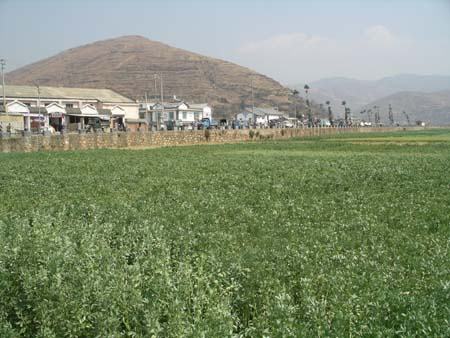
Paula: We flew to Dali early this morning and were met
with warm, comfortable air in this southern Chinese city which is situated
by the Erhai Lake and surrounded by mountains. Dali has a both a new city
which is only 50 years old and an old walled city with four beautifully restored
gates datin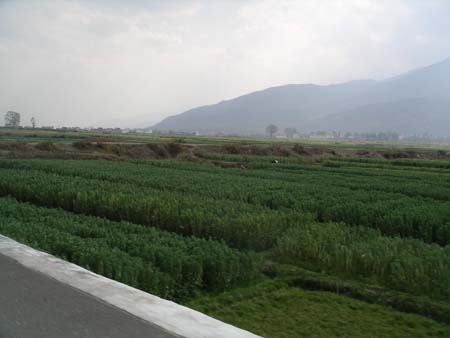 g
from the 14th century.
g
from the 14th century.
Dali is also in the Yunnan province, and is described in guidebooks as being one of the most beautiful and relaxed areas of China. This sounded pretty good at this point, especially after the last few days of travel. This morning's flight required us to get up at 4:30AM, and we've had just about enough of that…
The drive to Dali passed by large fields of green farmland, mostly filled
with tall bean plants that are now being harvested. Several other areas include
plots of rice, wheat and vegetables, and we saw many women with straw hats
and hoes working in their fields. All of the 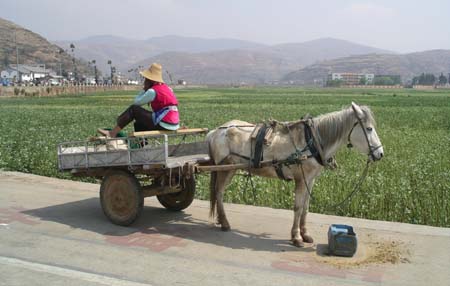 farming
appears to be done by hand, and we watched as families worked to prepare the
soil in large areas - very few had animals to help them. It was interesting
to think of our first experience seeing farming being done by animals - that
was way back in Morocco. At that time, we thought about how hard it must be
to farm without machinery. We realize that since then, we have seen almost
no farming done with the help of machinery - it's all done either with animals
or simply by hand.
farming
appears to be done by hand, and we watched as families worked to prepare the
soil in large areas - very few had animals to help them. It was interesting
to think of our first experience seeing farming being done by animals - that
was way back in Morocco. At that time, we thought about how hard it must be
to farm without machinery. We realize that since then, we have seen almost
no farming done with the help of machinery - it's all done either with animals
or simply by hand.
After getting settled in our hotel which is just on the outskirts of Dali's old city, we set out for a morning exploration of Erhai Lake. The lake is set in the middle of several fishing villages, and our plan was to take a boat across the lake, stop at an island, and then continue toward our waiting van so that we could drive along the shore and explore many of the fishing villages here.
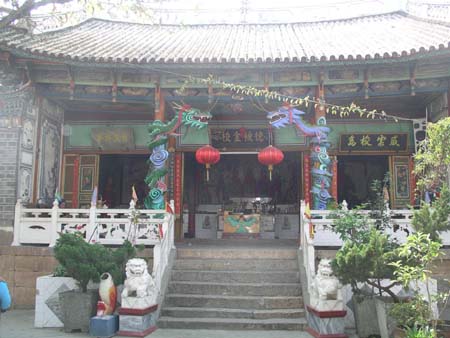 We
took a boat across the lake, stopping on one island to visit a local Buddhist
temple. Unlike most people in China who are athiest, 85% of people in Dali
are Buddhist. As we visited several other temples in other villages, it was
interesting to compare them to temples we have seen in
We
took a boat across the lake, stopping on one island to visit a local Buddhist
temple. Unlike most people in China who are athiest, 85% of people in Dali
are Buddhist. As we visited several other temples in other villages, it was
interesting to compare them to temples we have seen in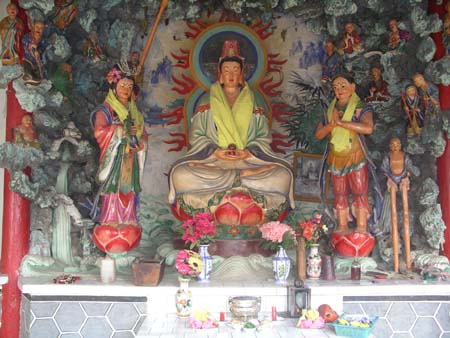 Southeast Asia. Similar to Vietnam, the village temples are dedicated not
only to Buddha but also to a past local community hero or leader. These important
ancestors are represented as golden statues just as prominently as Buddha.
The Buddha is quite different and represented as a reincarnated woman standing
in a lotus flower. Lee also told us that the Chinese believe that Buddhism
was created in China and don't accept its Indian origin.
Southeast Asia. Similar to Vietnam, the village temples are dedicated not
only to Buddha but also to a past local community hero or leader. These important
ancestors are represented as golden statues just as prominently as Buddha.
The Buddha is quite different and represented as a reincarnated woman standing
in a lotus flower. Lee also told us that the Chinese believe that Buddhism
was created in China and don't accept its Indian origin.
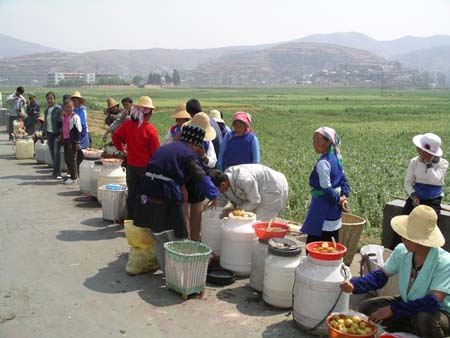 As
we stopped in our first fishing village, we enjoyed walking through a large
local market seeing fresh produce, shellfish and fish. We even saw dragonflies
being sold as food. The government is restricting fishing here
As
we stopped in our first fishing village, we enjoyed walking through a large
local market seeing fresh produce, shellfish and fish. We even saw dragonflies
being sold as food. The government is restricting fishing here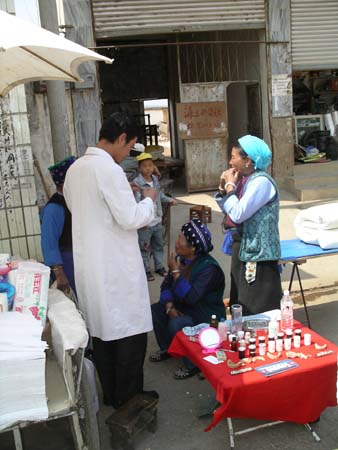 between March and August but there was still plenty in the market. We saw
huge clams and some tiny shrimp (which we ended up eating for lunch, shell,
head and all). The village people are primarily farmers and fishermen. Their
main crops are wheat and beans in winter, while corn and rice are grown during
the summer months. Many other vegetables and fruits are grown and sold in
the local markets including many mountain plants and roots. We saw wonderful
displays of herbal medicines for sale as well as a curb-side dentist doing
consultations.
between March and August but there was still plenty in the market. We saw
huge clams and some tiny shrimp (which we ended up eating for lunch, shell,
head and all). The village people are primarily farmers and fishermen. Their
main crops are wheat and beans in winter, while corn and rice are grown during
the summer months. Many other vegetables and fruits are grown and sold in
the local markets including many mountain plants and roots. We saw wonderful
displays of herbal medicines for sale as well as a curb-side dentist doing
consultations.
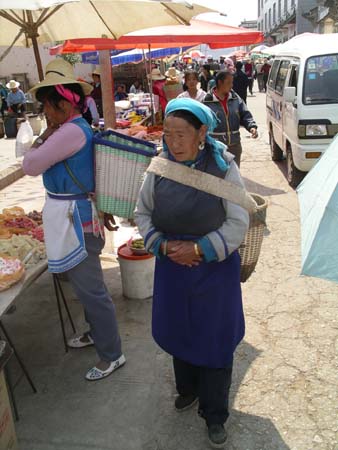 Most
of the people in the villages we visited today are from the Bai ethnic group.
Their colorful, traditional clothing made them immediately recognizable. Women's
clothing reflects their age and marital status. White is worn by unmarried
women, red or green by the middle aged and blue for older women. Unmarried
women also wear large headdresses representing the four elements important
in the culture - moon, rain, snow and flowers. By day's end, we had collected
some nice photos of the women but for the most part
Most
of the people in the villages we visited today are from the Bai ethnic group.
Their colorful, traditional clothing made them immediately recognizable. Women's
clothing reflects their age and marital status. White is worn by unmarried
women, red or green by the middle aged and blue for older women. Unmarried
women also wear large headdresses representing the four elements important
in the culture - moon, rain, snow and flowers. By day's end, we had collected
some nice photos of the women but for the most part 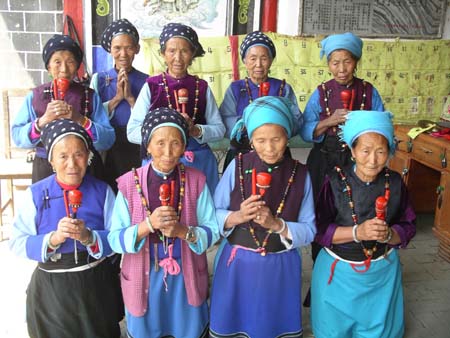 found
them quite shy. At one point, Steve successfully engaged a group of older
women for a photo, only to realize afterwards that they thought he would be
able to give them the photo after he showed them the digital image. Lee was
able to explain to them the fact that we couldn't give them a picture, and
they seemed very disappointed.
found
them quite shy. At one point, Steve successfully engaged a group of older
women for a photo, only to realize afterwards that they thought he would be
able to give them the photo after he showed them the digital image. Lee was
able to explain to them the fact that we couldn't give them a picture, and
they seemed very disappointed.
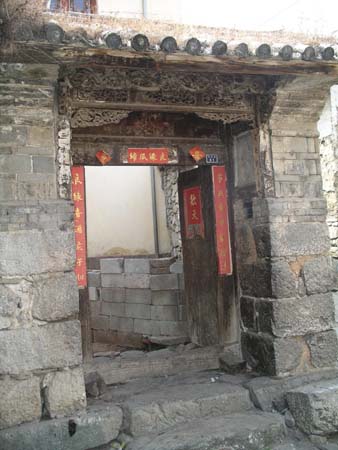 We
learned that the "gates" or front doors of Chinese homes are important
and often more money is spent on the gate than the furnishings inside The
gate often indicates special status and whether a wedding or death has occurred
in the household. The homes are simple stone homes with classical Chinese
roofs. The inside courtyards are often shared with animals. There is electricity
and
We
learned that the "gates" or front doors of Chinese homes are important
and often more money is spent on the gate than the furnishings inside The
gate often indicates special status and whether a wedding or death has occurred
in the household. The homes are simple stone homes with classical Chinese
roofs. The inside courtyards are often shared with animals. There is electricity
and 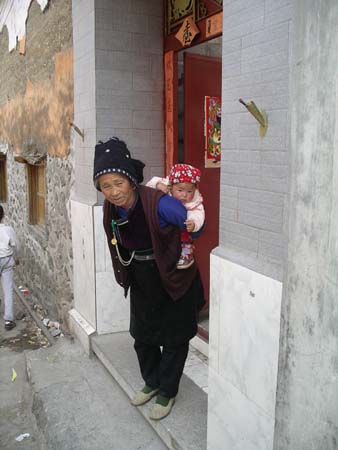 running
water but no refrigeration, stove top or heating. Coal burners are used for
cooking. Luxuries include TV, a washing machine and a motorbike or small truck.
running
water but no refrigeration, stove top or heating. Coal burners are used for
cooking. Luxuries include TV, a washing machine and a motorbike or small truck.
Each family in the countryside may rent up to 2,000 square meters of farmland from the government. The land is worked by hand or with the help of animals. Most farmers can generate an income of only $100 from their plot each year. As in other areas in Asia, we saw people working hard in their fields, carrying huge loads on their back in large wicker baskets.
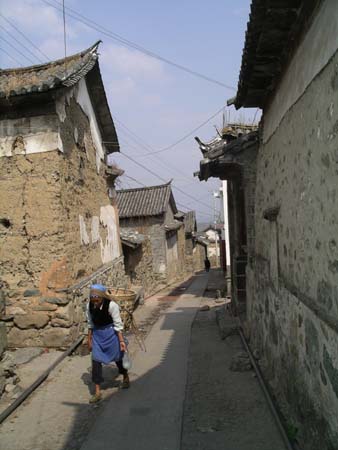 As
we drove around the lake, we stopped in 3 or 4 different villages, all fairly
similar. We appreciated being able to escape the huge hordes of Chinese tourists,
all with tour leaders dressed up in costumes that are supposed to represent
traditional Bai clothing (Lee told us that no one dresses like this anymore
- only the tour guides!).
As
we drove around the lake, we stopped in 3 or 4 different villages, all fairly
similar. We appreciated being able to escape the huge hordes of Chinese tourists,
all with tour leaders dressed up in costumes that are supposed to represent
traditional Bai clothing (Lee told us that no one dresses like this anymore
- only the tour guides!).
Our final destination was the old city of Dali, with its striking city gates
and wall. 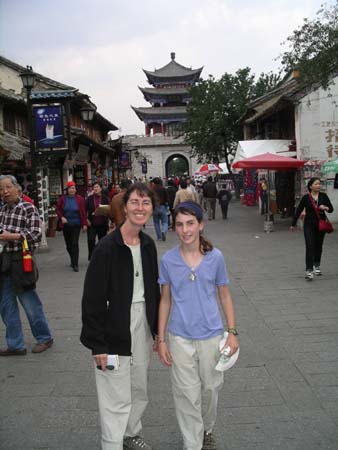 However,
inside we discovered thousands of Chinese tourists and shop after shop selling
souvenirs. There was even a street dubbed "Foreigners Street" where
Lee told us there many restaurants and coffee shops for tourists. Despite
its name, all the tourists we saw today were Chinese - we have seen very few
Westerners at all during our time in Yunnan province. As we walked along Dali's
central street, we almost felt like we were in an Asian Disney World on Main
Street.
However,
inside we discovered thousands of Chinese tourists and shop after shop selling
souvenirs. There was even a street dubbed "Foreigners Street" where
Lee told us there many restaurants and coffee shops for tourists. Despite
its name, all the tourists we saw today were Chinese - we have seen very few
Westerners at all during our time in Yunnan province. As we walked along Dali's
central street, we almost felt like we were in an Asian Disney World on Main
Street.
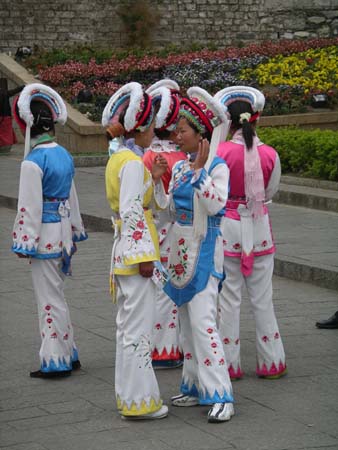 Tomorrow's
itinerary includes another large market and several other Bai villages. While
90% of people in China are Han Chinese, there are 54 other ethnic minorities
many living in the Yunnan Province. It will be interesting to learn more about
these ethnic groups over the next few days.
Tomorrow's
itinerary includes another large market and several other Bai villages. While
90% of people in China are Han Chinese, there are 54 other ethnic minorities
many living in the Yunnan Province. It will be interesting to learn more about
these ethnic groups over the next few days.
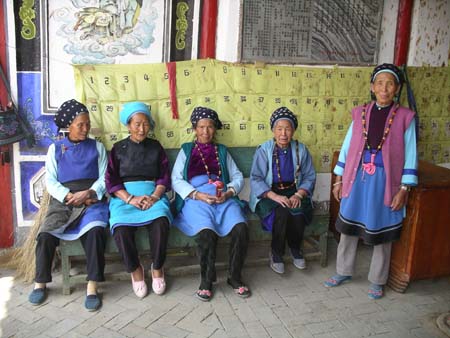
Katie's Kwick Kwacks - Impressions of the Villages around Dali. Today we visited a couple of villages around the famous lake in Dali. These villages were very different from the ones we have seen in other areas of Asia, and we found their cultural backgrounds to be fascinating. The next paragraphs describe some of my observations from these visits, and how the culture of this area affects the daily life of the people here.
Today we visited some very interesting villages along the Erhai Lake. These villages belonged to the Bai ethnic group-the largest group in the Yunnan Province. Although many people think all Chinese people look and act the same, we have learned that this is not true at all. China has a total of 55 major ethnic groups throughout the country. These groups have all different cultures, dress, and ways of life. It is impossible to understand all of these unique cultures in only 2 weeks, but we hope to get a least a reasonable sense of life here in China by learning about the daily activities of the people here. China is an extremely diverse country, and we enjoy seeing how each culture affect the places we go.
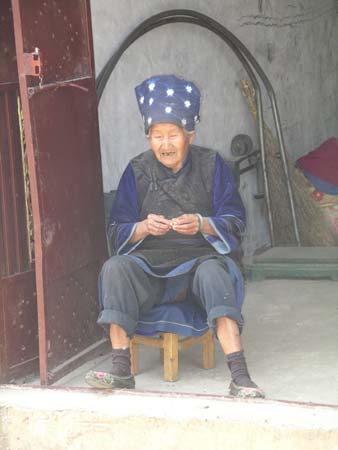 The
Bai culture, we discovered, affects village people in many ways. One of the
first things we noticed was how different their clothing was. They wore colorful
The
Bai culture, we discovered, affects village people in many ways. One of the
first things we noticed was how different their clothing was. They wore colorful
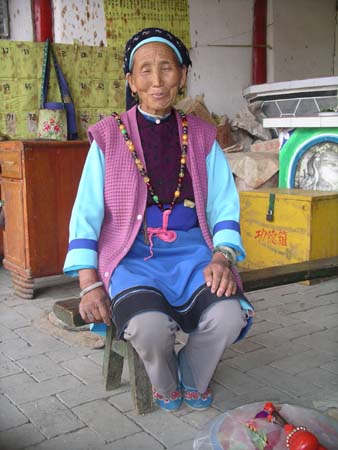 head dresses, embroidered blouses, and slipper shoes--all traditional and
festive looking outfits. We learned that the color of their outfits varied
depending on age. According to custom, the young women wear white outfits,
the middle aged women wear red/green outfits, and the elderly women wear blue
outfits. There are many other small indications on a women's dress, such as
bows, meaning the women is not yet married.
head dresses, embroidered blouses, and slipper shoes--all traditional and
festive looking outfits. We learned that the color of their outfits varied
depending on age. According to custom, the young women wear white outfits,
the middle aged women wear red/green outfits, and the elderly women wear blue
outfits. There are many other small indications on a women's dress, such as
bows, meaning the women is not yet married.
Another thing we noticed about this ethnic group was that the people all speak a different language. Their dialect is called Tibeto-Berman, and is carved from the Mandarin language. We were surprised to hear our guide struggling to communicate with the people there.
One more thing that made this group unique was the importance they place on religion. We learned that eighty-five percent of Bai people practice Buddhism, compared to the mere five percent in all of China. We saw many temples, and even experienced a religious ceremony in one of the villages. It was very obvious that Buddhism and religion are a major part of Bai peoples' daily lives here.
All in all, we learned a lot about how this Chinese ethnic group affects the people here, and hope to deepen our understanding of the country's unique cultures as we continue to travel through China.
David's Daily Dump - Government Control in China. Our one week stay in China has made me realize even more how lucky we are to be Americans. I have learned that it is impossible to appreciate our democratic government until you visit a Communist country like China. Our conversations with guides and local Chinese have proven to us how much control the government really has over the people.
Learning about the socialist party in China has been scary, astonishing, and also very sad. Some of the most depressing things that we have learned are how no one speaks badly of the government, or has an influence on what happens in the country. Everyone is scared of the government and dares not criticize it. They all think back to what happened in 1989 when hundreds of protesting students were shot for no reason.
Our guide in Beijing (Shu) told us stories of when he was a student protesting in Tiananmen Square. He said that if your teacher knew you were protesting they could tell the police and have you arrested. You would then never be able to graduate and get a good job. Protesting was extremely risky, devastating, and sometimes fatal. Luckily Shu had a nice teacher and had the morning shift of protesting on the day of the shooting, which took place at eight in the evening. Shu also told us that news of the shooting was not broadcasted until one week after the event! The government controlled what information was televised and none of it was entirely true. We kept asking Shu questions about what happened and most of the time he responded by saying, "you know more than I do."
We also met a man named Mr. Wu who showed us around his house. We asked him if he got CNN and what he thought the biggest problem the government was facing at the moment. He said he didn't get CNN, like all other Chinese throughout the country, and that he did not know what the biggest problem was. He didn't even have an opinion about where the country was headed. He told us that it was the government's job to deal with the problems.
Another guide we met named Annabelle told us that the older generation has the same opinions as Mr. Wu, but that the younger generation of students did not agree with the one party system and knew the disadvantages of the government. "What can we do?" Annabelle said, "after all, we do live in a Communist country."
To live in a country with freedom and democracy is only an unrealistic dream for the Chinese. We have learned that the government does not only control the people' opinions but also many other things like how many children you have, what age you get married, and what international news you hear. Chinese couples are only allowed to have one child after they are married at age 26-28. Our guides were amazed that there were no laws for marriage or number of children you have in the U.S and most were envious that we had two kids.
It has also been interesting for us to question our guides about the presidential shootings in Taiwan. Everyone we have asked told us that heard nothing about it. The government has decided not to release the information! CNN said that this is true and that no one in China knows!!
We found this along with everything else we learned about the Chinese government to be truly fascinating. It brings everything into perspective when you actually met people who don't know about the most popular international stories and are afraid to express their opinions about the Communists.
